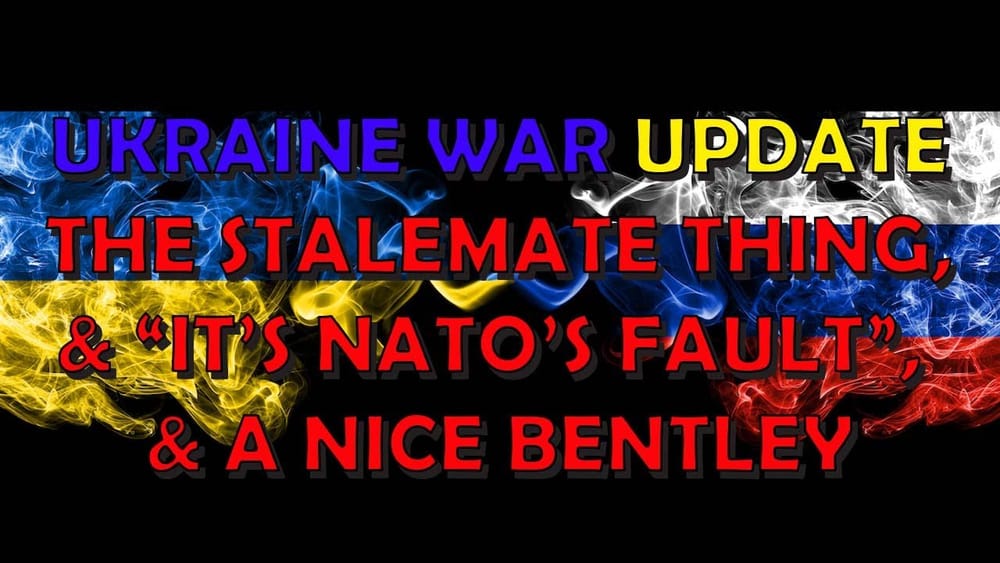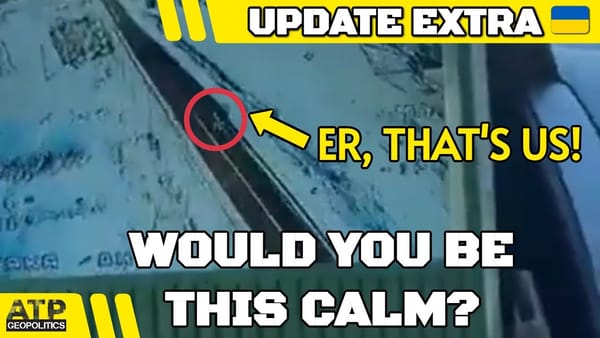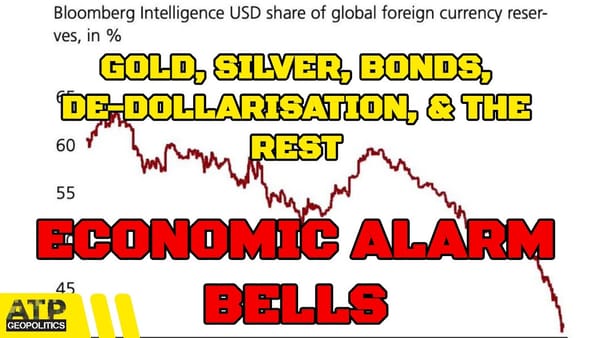Ukraine War Upd. EXTRA: Stalemate & "It's NATO's Fault"
Table of Contents 📖
Hello Team
🎦 00:00-00:21⏩
Jonathan welcomes viewers to another ATP Geopolitics EXTRA video - today's video is about the perception of stalemate in the war, and the idea that NATO is to blame for the war.
Return to top⤴️
The Perception of Stalemate
🎦 00:21-09:14⏩
Jonathan discusses an article by Jack Watling (RUSI) which argues the war in Ukraine is not a stalemate, rather a race between Moscow and Kyiv to rebuild. Whilst the first half of 2024 may bring few changes to territory control, long term trajectory depends on actions taken now to support Ukraine. Watling argues there are two possible futures:
- Ukraine, with Western support, rebuilds, degrades Russian strength and enters negotiations from a position of leverage.
- Ukraine, starved of support, is left exhausted, facing subjugation.
Jonathan agrees with Watling, stressing the second outcome would not only be undesirable for Ukrainians, but dangerous for the international norm against changing borders by force. Jonathan criticises politicians (particularly in the US) who prioritise domestic issues over supporting Ukraine, arguing this is shortsighted and will ultimately harm their own interests. He uses the analogy of ignoring a neighbour's house fire, only to have it spread and cause wider damage. He believes a Russian victory would embolden other aggressors (like China with Taiwan) and ultimately force the US into greater, more costly interventions in the future.
Return to top⤴️
Ukraine Needs More Than 5 Weeks of Training
🎦 09:14-12:25⏩
Jonathan highlights the inadequacy of short training courses for Ukrainian troops. He argues that Ukrainian geography necessitates skilled coordination and synchronization beyond the company level. However, the need to staff new units has resulted in a shortage of experienced officers, limiting the scale of operations the Ukrainian military can effectively mount. He notes the UK's Operation Interflex provides only 5 weeks of training when 22 weeks is considered the minimum requirement for this type of warfare.
Return to top⤴️
Ukraine Needs Materiel
🎦 12:29-23:27⏩
Jonathan shifts focus to Ukraine's critical need for materiel, particularly ammunition and artillery barrels. He highlights the disparity in artillery fire, with Ukraine's rate dropping significantly, while Russia's has increased, partly due to supplies from North Korea. He emphasizes the need for Ukraine to maintain localized offensives to keep up the pressure on Russian forces, even while in a defensive posture, citing the example of fighting in Kharkiv to illustrate this point. Jonathan argues Ukraine needs to maintain a high rate of attrition on Russian forces to offset Russia's larger army and greater capacity for mobilization. He suggests that drawing Russian forces into engagements where they suffer heavy losses, while strategically rotating Ukrainian troops, could be an effective strategy. Jonathan then highlights the challenge of procuring sufficient ammunition and artillery barrels to meet Ukraine's needs, noting the limitations of European manufacturing capacity. He also emphasizes the ongoing need for spare parts for donated military equipment and air defense interceptors to counter Russia's significant missile and drone production.
Return to top⤴️
Zelensky's Deadline, Western Dithering, and the Need for Long-Term Investment
🎦 23:27-33:24⏩
Jonathan discusses President Zelensky's ambitious (and likely unrealistic) goal of liberating all occupied territory by October 2024, attributing this to fears of waning US support following the upcoming presidential election. He observes that this highlights the political tightrope Ukraine has to walk, caught between the need for Western aid and the domestic political pressures faced by its allies. Jonathan then criticizes the "chicken and egg" situation surrounding Western support, where allies demand a long-term plan before committing to aid, while Ukraine argues it can't formulate a plan without knowing what resources it will have. Jonathan argues that Western nations must recognize the need for long-term investment in their own domestic defence manufacturing capacity. He points out that the cost of supporting Ukraine is minimal compared to their overall defense budgets and offers significant economic benefits. He refutes the notion that aid to Ukraine undermines the West's ability to deter China, arguing that failure to support Ukraine would have a far more damaging effect on global perceptions of Western resolve.
Return to top⤴️
"It's NATO's Fault" - Jonathan's Frustrations
🎦 33:24-49:51⏩
Jonathan addresses the argument that NATO is to blame for the war in Ukraine, an argument he finds deeply frustrating. He argues that this viewpoint ignores Russia's own actions and motivations, focusing solely on NATO expansion as the primary driver of conflict. He criticizes this perspective as being naive, simplistic, and reliant on a flawed understanding of causality. He argues that while NATO's actions may have played a role, focusing solely on them ignores the complex interplay of historical events and geopolitical realities. Jonathan uses the analogy of blaming only the mother for a child's criminal behaviour, ignoring the father's role, to highlight the fallacy of this argument. He argues that Russia's long history of meddling in Ukrainian affairs and its 2014 invasion of Crimea cannot be ignored when assigning blame. Jonathan emphasizes that while there may be nuances and shared responsibility in the events leading up to the war, Russia's decision to invade Ukraine is the defining factor. He urges viewers to consider the perspective of the Ukrainian people and their right to self-determination, rather than viewing Ukraine solely as a pawn in a geopolitical game between NATO and Russia. He criticizes those who solely blame the West as giving "a free pass for Russia to do what they like".
Return to top⤴️
Wrap Up: Humour - Ukraine's Take on Bentley Adverts
🎦 49:51-53:02⏩
After a long discussion about the geopolitical complexities of the war, Jonathan lightens the mood by sharing some humorous videos made by Ukrainians. The videos are parodies of Bentley car adverts, highlighting the resilience and dark humour of the Ukrainian people in the face of adversity. Jonathan signs off, thanking his viewers and supporters.
Return to top⤴️
"This is a geopolitical game of chess, but...we shouldn't forget that this is not just a match between NATO and the West and Russia. There is a third player, the most important player player here and that is Ukraine and the Ukrainian people...let's just ask them what they want."




